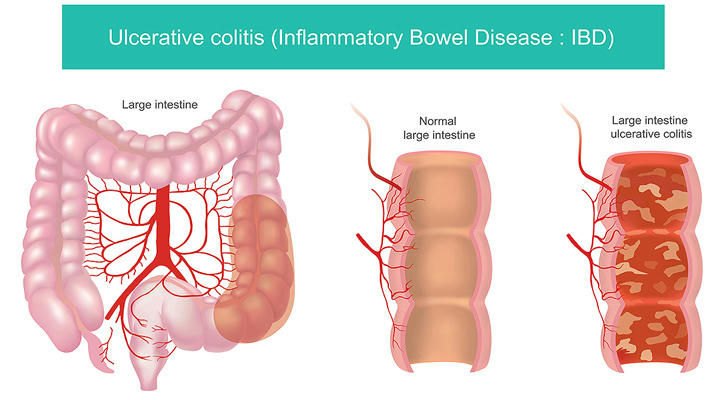Comprehensive Guide to Ulcerative Colitis Medications in the U.S.: How to Choose Treatment for Relief in 2025
Ulcerative colitis (UC) is a chronic inflammatory bowel disease (IBD) that affects the colon and rectum, causing symptoms like abdominal pain, diarrhea, fatigue, and rectal bleeding. In the United States, millions of people live with UC, and effective medications are essential for controlling symptoms, reducing flare-ups, and maintaining remission.

With ongoing advancements in treatment, patients in 2025 have more options than ever—including aminosalicylates, corticosteroids, immunomodulators, and biologics. This guide provides an overview of ulcerative colitis medications available in the U.S., helping patients and caregivers better understand their options for relief and long-term management.
Understanding Ulcerative Colitis Treatment in the U.S.
Treatment for UC in the U.S. typically focuses on three goals:
- Reducing inflammation in the colon and rectum.
- Managing symptoms such as abdominal pain and diarrhea.
- Maintaining remission to prevent flare-ups.
Because UC presents differently for each patient, choosing the best medication depends on disease severity, prior treatment response, and overall health.
Main Types of Ulcerative Colitis Medications
1. Aminosalicylates (5-ASAs)
Examples: Mesalamine (Apriso, Asacol HD, Lialda), Sulfasalazine.
Use in U.S.: Often the first-line treatment for mild to moderate UC.
Function: Reduce inflammation in the lining of the colon.
2. Corticosteroids
Examples: Prednisone, Budesonide.
Use in U.S.: Short-term treatment for flare-ups when other medications are insufficient.
Note: Not recommended for long-term use due to potential side effects (osteoporosis, high blood pressure, weight gain).
3. Immunomodulators
Examples: Azathioprine, Mercaptopurine.
Use in U.S.: For patients who don’t respond well to 5-ASAs or steroids.
Function: Suppress the immune system to reduce chronic inflammation.
4. Biologics & Targeted Therapies
Examples: Infliximab (Remicade), Adalimumab (Humira), Vedolizumab (Entyvio), Ustekinumab (Stelara), JAK inhibitors like Tofacitinib (Xeljanz).
Use in U.S.: For moderate to severe UC or patients unresponsive to conventional therapy.
Function: Target specific immune pathways to control inflammation.
Over-the-Counter (OTC) Supportive Options
While most UC medications require prescriptions, some OTC options may provide symptom relief:
Antidiarrheals: Loperamide (Imodium) – useful for mild diarrhea but should be used cautiously.
Pain relievers: Acetaminophen (Tylenol) – safer than NSAIDs, which can worsen UC symptoms.
Probiotics & supplements: Sometimes recommended to support gut health.
⚠️ OTC remedies should not replace prescription treatment. Always consult a U.S. healthcare provider before adding them.
Choosing the Right UC Medication in the U.S.
There is no one-size-fits-all treatment. Factors considered by U.S. gastroenterologists include:
Severity of disease (mild, moderate, severe).
Patient’s medical history and lifestyle.
Insurance coverage and cost of biologics.
Tolerance to side effects.
Typical strategies include:
Mild cases: Start with 5-ASAs (mesalamine).
Moderate cases: Combine 5-ASAs with corticosteroids or immunomodulators.
Severe cases: Biologics or targeted therapies, sometimes in combination with immunomodulators.
Regular check-ups and colonoscopies are standard in U.S. care to track treatment progress.
Ulcerative Colitis Medication List (U.S. 2025)
Aminosalicylates: Mesalamine (Apriso, Asacol HD, Lialda), Sulfasalazine.
Corticosteroids: Prednisone, Budesonide (Uceris).
Immunomodulators: Azathioprine, Mercaptopurine.
Biologics: Infliximab (Remicade), Adalimumab (Humira), Vedolizumab (Entyvio), Ustekinumab (Stelara).
Targeted Therapies: Tofacitinib (Xeljanz), Upadacitinib (Rinvoq).
Resources and Support in the U.S.
Patients can access information and financial support through:
Crohn’s & Colitis Foundation (ccfa.org) – patient education, support groups, cost-assistance programs.
American College of Gastroenterology (gi.org) – treatment guidelines and research updates.
Patient assistance programs from pharmaceutical companies – help lower the cost of biologics.
Conclusion
Managing ulcerative colitis in the U.S. requires a tailored approach, balancing symptom relief with long-term remission goals. With a wide range of medications available in 2025—from traditional aminosalicylates to advanced biologics—patients can work with their healthcare providers to design the best treatment strategy.
Staying informed, understanding available medications, and accessing U.S.-based support systems can empower patients to take control of their health and improve quality of life.
